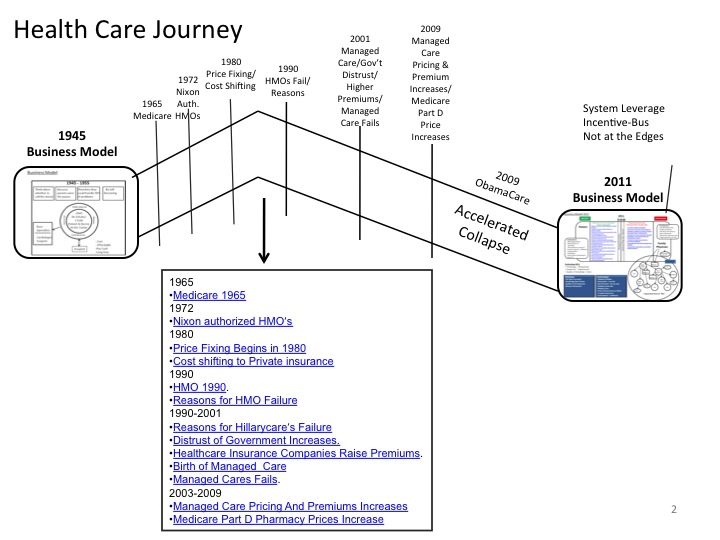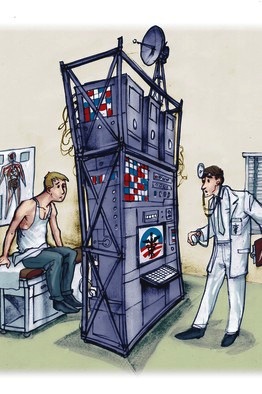Why Republicans Need A Viable Healthcare Plan NOW
Stanley Feld M.D.,FACP,MACE
I have been asked by many of my conservative friends why so many of my liberal friends believe Obamacare is great.
My liberal friends think conservatives are are illogical, callous, spiteful, partisan and soulless. Some even believe conservatives are ignorant.
Obamacare provides coverage for people who cannot get coverage or afford healthcare coverage in the pre Obamacare era. Insurance options and county healthcare system were inadequate for servicing these people.
It turns out that people who need to buy healthcare insurance coverage through Obamacare cannot afford the coverage either.
Even with the illegal subsidies they cannot afford the deductibles.
Obamacare is not the solution to our healthcare system problems. Obamacare is an inefficient bureaucracy that was pasted onto a pre-existing dysfunction and unsustainable healthcare system.
The costs overall are increasing despite the Obama administration and progressives telling us the costs are decreasing. Healthcare taxes have increased the overall federal tax rate to 50%.
Americans have not been provided with the real tax rate increases or unemployed or partially employed statistics since 2009. Yet progressive quote the figures the administration provides as absolute facts.
Americans know something funny is going on because they have less money to spend.
Progressives do not want to understand these consequences. The acceleration of unintended consequences of Obamacare will lead to the economic collapse of the healthcare system as well as the economic collapse of the country.
Progressives want to ignore the effects Obamacare is having on the economy even though only 15 of the 350 million of us are in the individual market and less that 7 million are insured under Obamacare.
Progressives ignore the facts and revert to name calling aimed at conservatives.
Conservatives do not know how to respond. Progressives continue to call conservatives tax adverse, callus, ignorant and for the vested interest of big business.
I try reading and listening both the progressive and conservative media. Progressives play the same theme continuously.
Progressives continuously use emotionally charged examples that anyone would be sympathetic to. At the same time they belittle their “conservative opponents.”
A New York Magazine article by Jonathan Chait entitled, “Yes, the Republican Obamacare Strategy Will Kill People” illustrates my point.
“There is a famous thought experiment called the trolley problem, and it goes like this: A runaway trolley is headed toward five people bound on the tracks. You are standing before the switch that could divert it onto another track, where it would kill only one person. Do you pull the switch?
The problem is a way of grappling with the moral responsibility of actively killing a person for some larger end, a problem that lurks behind much of the role of the state, from policing to Harry Truman dropping the atomic bomb on Japan.”
The reader should not be confused by where this story is going. It is a distraction from the real problems of Obamacare’s healthcare policy and implementation.
“The trolley problem is the most flattering possible way to think about the conservative movement’s fanatical commitment to repealing Obamacare.”
“ That is, if you ignore the obvious elements of partisan spite, callousness, and self-deception, one can posit a commitment to abstract moral principles about the role of the state.”
This sentence serves as an invective against the conservative enemy.
“Conservatives’ abstract principles, like most people, can come attached to specific costs. If they pull the switch and repeal Obamacare, or if they persuade five Republican Supreme Court justices to cripple it, they will spare America from the evils of mandates, taxes, regulation, and what they imagine being European socialist horrors. They will also kill what are now identifiable human beings”.
This sums up progressives’ attack against conservatives. The reader will be convinced that the conservatives are evil, use corrupt tactics and act immorally.
Mr. Chiat ignores the unworkable healthcare policy and economically unsustainable facts.
It is all about character assassination of an opponent. It is a typical Saul Alinsky tactic.
Mr. Chiat then goes on to describe a Washington Post report of a patient (Mr. Tedrow) who without the benefit of Obamacare’s health insurance exchange coverage plus subsidy could not have had a liver transplant. Obamacare saved the patient’s life.
There have been many stories like this published in the traditional progressive media in defense of Obamacare.
The article states that all the Republican Party wants to do is repeal Obamacare and go back the pre-Obamacare dysfunctional healthcare system.
The New York Magazine article presupposes that a Republican Healthcare Plan will ignore patients like David Tedrow.
“The Republican health-care strategy is to flip a switch whose immediate effect will be to impoverish and kill a lot of people. Is there a single conservative who will admit this?”
The article also presupposes that Republicans will just flip the switch on the people that need help and kill them.
Republicans must immediately present an understandable healthcare plan to the public that is sustainable and will preserve our freedoms to make our own our healthcare decisions rather than the government choosing for us.
Republican cannot propose tweaks around the edges of Obamacare such as repealing the medical device tax. This proposal will have little effect on repairing the healthcare system.
A reader responding to by last post wrote that describe the writing of a sustainable plan,
“I think you could more simply say this to rally America:
“We must change our healthcare system because its current costs are unsustainable. The only two choices we have is to freely change it by taking more responsibility for ourselves (The American Way) or be forced to do what the Government tells us to do (The Obamacare way).”
“After that, everything else is tactics. Obamacare must be seen for what is it, Government force. It is not healthcare.”
I think the majority of voting Americans, who take the time to think about these things, are aware of the limitations on our freedom to choose and the financial unsustainability of Obamacare.
Americans are aware of the fact that they have been lied to by the Obama administration over and over again. Americans do not trust the Obama administration to make serious healthcare decisions for them.
They do not understand what they can do about it. The President and the congress are supposed to work for us. It is imperative to express your opinion to them.
They understand the progressive spin masters whose only tool is to discredit conservative integrity, thought and intentions.
The opinions expressed in the blog “Repairing The Healthcare System” are, mine and mine alone
Please have a friend subscribe

